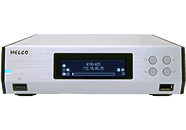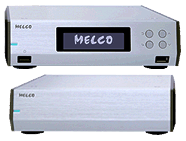Music Libraries@kemela
Music Libraries are dedicated High Fidelity components for storing digital files with a systematic organization so you can easily find the music you want to listen to. Just as books are classified and arranged using Library of Congress or the Dewey Decimal classification systems so they can be located more precisely in a library than in a bookstore, you can organise your digital files so you can always find what you need. Unlike the generic nature of a P.C. or operating system, by using specialized technologies designed to preserve digital signals without degradation, far higher sound quality can be obtained when used in an optimally designed digital system.
High Resolution Audio
Because of storage and procesing power limitations in portable players, MP3 was the dominant format for digital files at the turn of the century. Whether MP3 was as good as CDs was debated at the time but with today's DACs there is no debate. Now a quarter of a century later, whether high resolution audio sounds better than CDs has been adjudicated in favour of high resolution. Of course recordings have to be well made with excellent analog to digital conversion - as crucial to CD sound as high resolution files - but given the choice, high resolution digital files are preferred.
Convenience
Music Libraries sit on your home network and music played is controlled by apps on your tablet or phone communicating wirelessly with the router. This is a far more convenient method than working with a PC or laptop and you won't be hunting for lost CDs that have been misplaced on the shelf or worse in the wrong jewel case!
Locally Stored versus Online Services
Sound quality is superior with locally stored digital music files because you have the full set of data in the correct sequence and it only has to be read off like a CD. With online streaming, after being routed through the internet via many different routes, data packets may arrive out of sequence, duplicated, or missing (the internet is not a guaranteed delivery service) With any kind of streaming, TV or audio, playback occurs while subsequent data is still being received and there is a real possibility of stalling if, due to congestion, packets are delayed for too long and there's no going back for another attempt. With higher resolutions more data has to be delivered in a given time and there is a greater probability of a missing piece. Greater Internet speeds alone will not improve the flow of traffic if there is a bottleneck due to a congested pipe segment, or if the demand is greater than the servers can provide.
Streaming Services v Downloaded files
Music streaming subscriptions have grown considerably in the past decade and account for over 80% of the music industries revenue and over 80 million Americans listen to music using a premium streaming service. A huge collection of very good sound quality tracks are available to stream from Qobuz, Tidal, Spotify and others. Easy to use affordable products make streaming very straight forward. What's stopping you from exploring music through these online services or building your own library of studio quality versions of your favorite music?
Faster internet has afforded a significant boost in sound quality that is well worth the premium subscription rate of the music services but the full value is only realized if these services are streamed on high quality audio streamers and DACs. Convenience was the initial appeal of these services, but savvy consumers have come to appreciate that better sound quality enhances their enjoyment and new music discovery.
Replacing your old CD player
The price of an entry level Digital Music Library, back-up portable USB drive and optical drive to rip CDs is about the same or less than a mid-level CD player. If you only listen to compressed popular music, a good streaming DAC and streaming service subscription might be all you need. Large CD collections might take a while to rip (usually about 3 mins per CD) and if you like the CD booklet you might purchase a good CD player or a CD transport and external DAC. Some CD players also include a streaming module.
However, for those whose music collections include Jazz or Classical music, a music library is well worth considering. Newer high resolution recordings are better at revealing musical structure and will re-enchant you to pieces performed in a more up-to date manner often with musicians with better technical skills than those from the last century. But since Music Libaries have built-in streaming you can have the best of both worlds and because they don't come with DACs, obsolete DACs are not a concern.
Advice and support
The digital world is fast moving and can be a bit overwhelming if you are not particularly technically inclined. You could spend a lot of time in forums and reading reviews only to have too narrow a focus or base your thinking on out of date information. With streaming products, having access to good support is more important than any other audio component.



